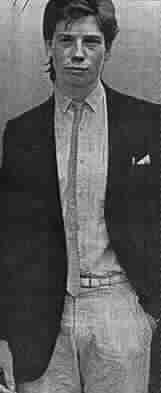Daily Mail, London, 14 November 1992Public schoolboy awarded £8,000 for caning ordealBy Peter Walsh (extract)A former public schoolboy subjected to a severe caning has received £8,000 compensation. Matthew Prince was 15 when he was struck across the buttocks four times for defacing a file belonging to another pupil. His furious mother pursued the matter through the courts, even though corporal punishment was then legal. Now, after a nine-year battle that went all the way to the European Court of Human Rights, the Government has settled out of court. It will also pay legal costs of some £12,000. Mr Prince, now 25, from Hove, Sussex, was a day pupil and captain of the rugby team at Brighton College, whose motto is Let The Right Prevail. He said that headmaster William Blackshaw took several steps back, then ran forward before hitting him. After he went home, his mother Valerie took him to the family doctor, who found four 6-inch weals and 'heavy bruising and swelling' on his buttocks. Police were asked to consider charging Mr Blackshaw with assault causing grievous bodily harm but ruled it out. A county court later dismissed a civil action by his mother and father Brian, who owns a building firm. They were claiming damages for assault, but the judge said there had been nothing unusual or excessive in the caning and they had over-reacted. The family took the case to Strasbourg, alleging that the punishment constituted degrading treatment contrary to Article 3 of the European Convention on Human Rights. The Government settled before the case went ahead, even though corporal punishment was not abolished in state schools until 1987, and is still legal in independent schools with parental consent.
Britain was party to the Convention -- which classifies caning as an 'inhuman or degrading' punishment -- at the time of the incident. [Note by C.F.: This is wrong. The Convention doesn't mention caning, or even "corporal punishment".] The out-of-court settlement provoked anger from campaigners who believed the test case could have put an end to corporal punishment in all British schools. Peter Newell, of the group End Physical Punishment of Children, accused the Department for Education of using taxpayers' money to defend institutionalised child abuse. He claimed 'There is neither humanity nor logic in Government policy. The Department of Health has ended corporal punishment in all child care settings, both public and private, including foster care and child minding.' UnrepentantThe department said corporal punishment was allowed in private schools on grounds of parental choice, as long as each school's prospectus made its views on the subject clear. Mr Blackshaw, 62, retired six years ago from the school, which is now co-educational and has abolished corporal punishment. Its fees are £2,110 for day pupils, £3,210 for boarders. The former head remains unrepentant. At his home in nearby Rottingdean he said: 'For a boy, I still believe that in the proper circumstances it is the best punishment. I suffered corporal punishment. It did me no harm.' |

